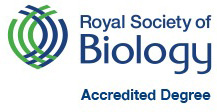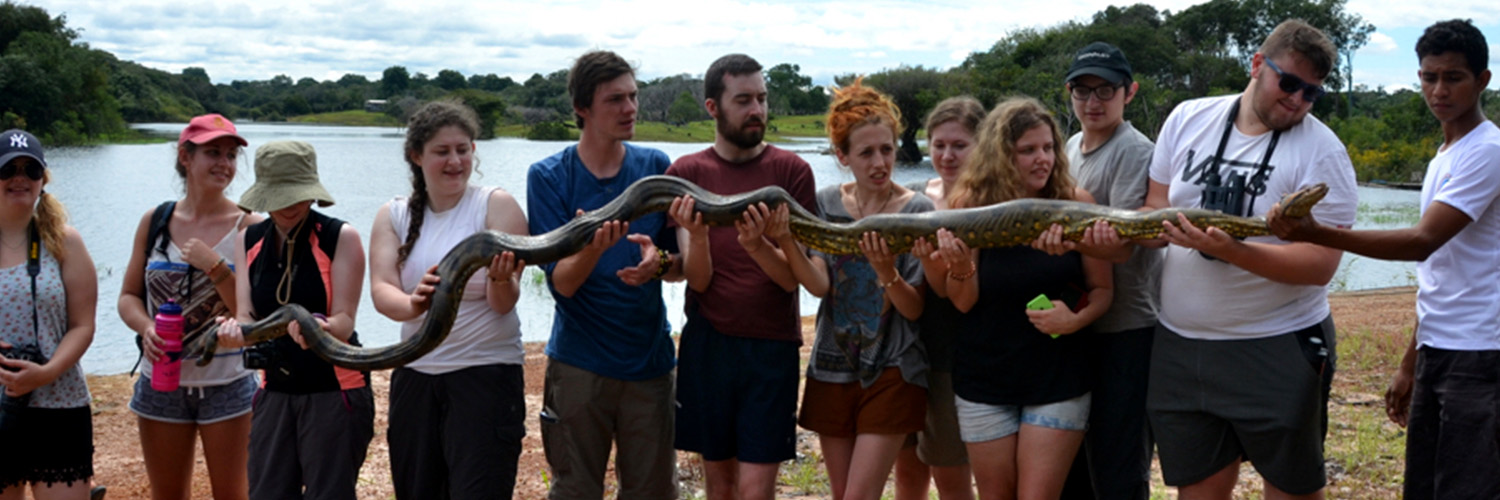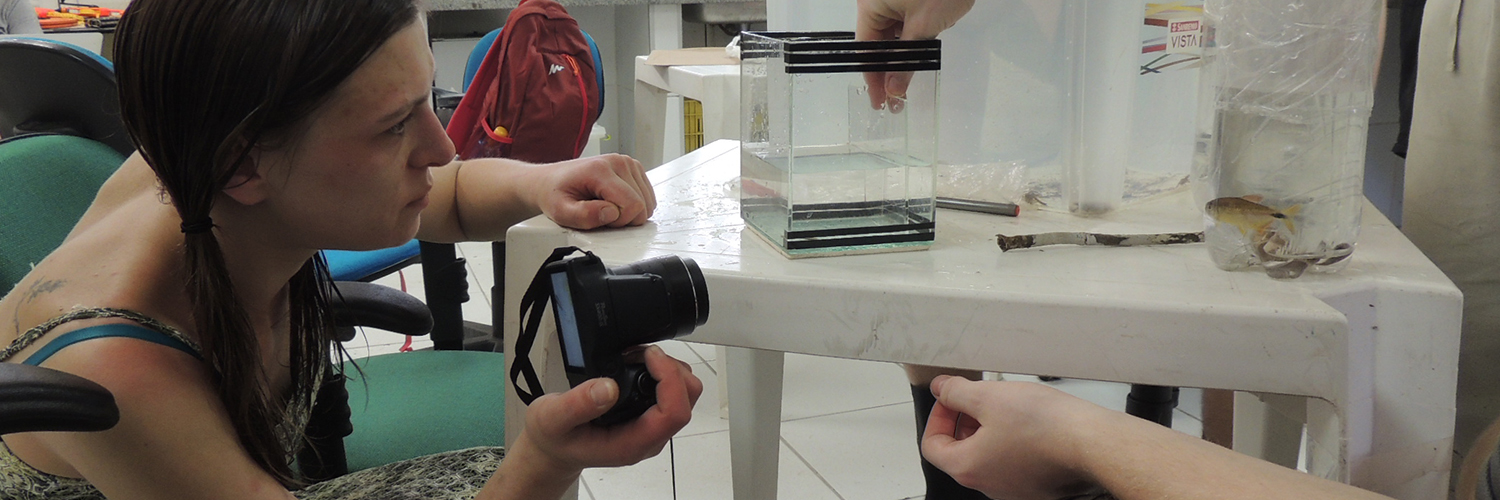Biodiversity
Wildlife Conservation with Zoo Biology with Studies in the USA
School of Science, Engineering and Environment
Full-time
With placement
Three year
Four year
September 2024
In a nutshell
Human impact on the natural world has left a devastating impact on global wildlife habitats and biodiversity. Be part of the solution by building conservation theory and practice with our BSc (Hons) Wildlife Conservation with Zoo Biology with Studies in the USA degree.
Accredited, career-focused learning
Accredited by the Royal Society of Biology, our course focuses on understanding biological process and exploring conservation in zoos and out in the wild. You will experience hands-on learning in our advanced Bodmer laboratories and develop transferable skills interpreting biological field data.
Immersive, international study
Through our close connections with local zoos and aquariums, and our use of immersive field trips, we will help you bring textbook theory to real-world practice. Partnering with Otterbein University in the USA, you will also have the opportunity to spend your second year experiencing study overseas.
Learn more about studying wildlife conservation and zoo biology, explore course modules and speak to the course team, by attending our next Open Day
You will:
- Acquire the practical skills needed wildlife conservation careers
- Experience a variety of field trips and residentials, both in the UK and overseas
- Combine theoretical knowledge with practical skills in our Bodmer laboratories
- Experience international study in the USA with our partner Otterbein University
options available
students accepted
Course accreditations

All about the course
Course Delivery
There has never been a more urgent time to reduce the loss of biodiversity. To be part of the solution, you will need strong theoretical knowledge and practical skills to save our precious wildlife and ecosystems.
We have designed this course to provide you with a broad understanding of wildlife, biodiversity and conservation alongside specialist knowledge in areas such as monitoring environmental change and habitat conservation and restoration:
- In your first year you will study a range of topics across several modules covering both theory and practice across the biological and environmental sciences
- As you progress into year two, you will expand your subject knowledge and take specialist modules in wildlife behavioural ecology, conservation biology and zoo animal management.You can also choose to spend your second year studying with our partner Otterbein University in the USA
- Returning to Salford for your final year, you will undertake a research project based on a subject topic of your choice as well as taking core and optional modules, including zoo organisation and regulation
Learning Experience
We put fieldwork at the heart of your learning experience. You will experience field trips to zoos, animal parks and wetlands, which may include visits to Chester Zoo, South Lakes Wild Animal Park, Knowsley Safari Park, Blackpool Zoo, Twycross Zoo, Dudley Zoo and Martin Mere (Wildfowl and Wetlands Trust). In previous years, travel to the Amazon Rainforest has been part of the course.
Small group, research-led teaching is another key course benefit. During your studies you will spend time in our advanced Bodmer laboratories, and you might have opportunities to engage with live research projects.
Study in the USA
One of the most exciting features of this course is the inclusive year of study in the USA at Otterbein University, Ohio. Here, you will choose from a range of interesting modules and benefit from Otterbein's close links with local zoos and aquariums. Along with experiencing USA collegiate life, and making memories and new friendships, you can also use the exchange as an opportunity to travel around the big states of America.
Industry Placement
On this course, you will have the option to take an industry placement year between years two and three. Although you will be responsible for securing your placement, our tutors will support you in finding a role, and monitor your progress throughout.
Industry placements are an excellent way to enhance your CV, gain hands-on work experience and build industry connections. We often find that placement students achieve higher final year grades.
Previous wildlife students have completed work placements both in the UK and overseas in South Africa, Madagascar, Spain, Greece and the USA, working with a wide range of animals from donkeys and wolves to seals and turtles.
Life arose on Earth at least 3.5 billion years ago. Today, Earth hosts an extraordinary diversity of organisms, with recent study estimating that there are between 2 and 20 million eukaryote species alive today (the vast majority of which have still not been identified and described by scientists). However, this is a small fraction of all the species that have ever lived, >99.9% of which are extinct. This module will give you an overview of this remarkable biodiversity, focusing on the major groups, their characteristics, their diversity, and their evolutionary relationships.
Genes to Ecosystems
In the first trimester, this module provides a systems-led approach to understand basic concepts of genetics. In the second trimester, this approach is extended to understand basic concepts of ecosystems.
Introduction to Zoo Biology
This module provides an integrative approach to understand basic concepts of zoo biology. It is largely lecture-based, and also includes day trips to local zoos.
Field Biology
This module will introduce students to field techniques required for ecological surveys of land and aquatic habitats. Learning will be delivered by lectures, non-residential fieldwork, computer and practical classes. The module will develop students to identification and taxonomy skills, and introduce GIS and its uses within fieldwork.
Global Distribution Wildlife
The module provides you an overview of the world’s major biomes. You learn about the importance of biogeography and the principal factors that drive the distribution of species and communities and how wildlife adapts to these factors.
Study Skills
In this module you will learn by observation, investigation, comparison and engagement and will develop practical learning and presentation methods which can be applied generically during year one and beyond. You will also gain an appreciation of Personal Development Planning and effective data handling, calculation and numerical skills.
Otterbein University
This course includes the option to spend your second year studying with our partner Otterbein University in the USA.
In year 2 at Otterbein University you will study a range of core and optional modules. Throughout the year you will be supported by a tutor based in Salford whom you will have had as your first year tutor and also by a local tutor at Otterbein.
Core modules:
Conservation Biology
Math (Statistics 1)
Animal Behavior
Zoo Enrichment and Animal Training
Zoo Management & Conservation Engagement
Optional modules - you can choose 2 from the following:
Genetics
Ecology
Marine Science
Evolution
Wildlife Rehabilitation
Zoo Organisation and Regulation
Learn about the structure and function of the zoo community at a national, European and international level - its legal regulation and its role in wildlife conservation.
Zoo and Exhibit Design
On this module you will integrate knowledge from previous zoo biology modules into a practical application. You will gain an understanding of how zoos achieve their stated aims from an economic, practical and scientific view-point and the strategies they use to advance their stated goals.
Practical Ecology and Conservation
This module aims to equip you with the basic knowledge and skills needed for ecological consultancy. It is designed to promote employability and apply academic qualifications to a growing sector that seeks to provide expertise on ecological and environmental issues to industry, governmental agencies and other organisations. You will be given an overview of consultancy and the ecology of survey methods used for protected species and habitats. The main assessment will involve you proposing surveys for a client wanting to build on a specified site, in addition to carrying out surveys in practical sessions.
Choose one option from the following:
Final Year Project and Professional Skills (HANS)
This dissertation module allows you to develop independent research skills, including both data collection/generation (for example, via lab-based research or fieldwork) and analysis, while conducting research on a topic in an area relevant to your programme of study. You will also develop your professional skills, with a focus on employability.
Final Year Project with Science Communication and Professional Skills
This dissertation module allows you to develop independent research skills, including data analysis, while conducting research on a topic in an area relevant to your programme of study. You will learn about science communication and the variety of methods in which science can be disseminated and communicated, and then put these methods into practice. You will also develop your professional skills, with a focus on employability.
Plus one option from the following:
Animal Cognition and Social Complexity
The aim of this module is to develop an understanding of the cognitive abilities and limitations of nonhuman animals, with a particular focus on nonhuman primates. The course also develops your understanding of the cognitive challenges associated with living in complex social groups.
Environmental Geographical Information Systems
The aim of this module is to develop your knowledge and understanding of the factors controlling the design and implementation of GIS solutions to map, monitor and model terrestrial environments. You will also examine the major issues and impacts of GIS evolution and diffusion on society.
Tropical Ecology and Conservation
This module is based round a 2-week field trip to a tropical biology field station. Students will learn concepts in, and approaches to, tropical ecology and conservation and biodiversity in tropical ecosystems. The module involves an independent research project in the field that will be written up as a scientific report.
University Wide Language
Courses are available in: Arabic, German, French, Italian, Japanese, Mandarin Chinese and Spanish.
And one option from the following:
Applied Freshwater Biology
This module aims to enable you to gain a knowledge and critical understanding of the biology and ecology of freshwater systems relevant to the water industry and related organisations which regulate and control pollution of the aquatic environment.
It also provides you with the necessary skills and techniques to undertake biological and chemical evaluation of water quality ecology, fish population and condition to apply these in novel situations to generate data for interpretation. In particular, you will be provided with the necessary laboratory skills to test water quality to the standards of the Water Framework Directive UK.
Veterinary and Zoonotic Infectious Diseases
This module looks at the maintenance and transmission of infectious diseases of veterinary or zoonotic interest. Particular interest is focused on the role of wildlife species in the ecology and epidemiology of infectious diseases. The role of arthropod-vectors in transmitting infections, and how this influences the ecology of such infections, is also studied.
Tropical Ecology and Conservation
This module is based round a 2-week field trip to a tropical biology field station. Students will learn concepts in, and approaches to, tropical ecology and conservation and biodiversity in tropical ecosystems. The module involves an independent research project in the field that will be written up as a scientific report.
University Wide Language Programme
This module provides the opportunity to learn or develop a language with the University-wide language programme.
Please note that it may not be possible to deliver the full list of options every year as this will depend on factors such as how many students choose a particular option. Exact modules may also vary in order to keep content current. When accepting your offer of a place to study on this programme, you should be aware that not all optional modules will be running each year. Your tutor will be able to advise you as to the available options on or before the start of the programme. Whilst the University tries to ensure that you are able to undertake your preferred options, it cannot guarantee this.
School of Science, Engineering and Environment
Rising to the challenge of a changing world, our degree courses are designed to shape the next generation of urbanists, scientists, engineers and industry leaders.
Driven by industry, and delivered by supportive programme teams, you can develop the knowledge and skills to become unstoppable in your career.
facilities
Experience a modern learning environment at our Peel Park campus, featuring accessible lecture theatres and AV-equipped classrooms, computing suites and multimedia libraries, with access to industry journals, databases, and simulation software.
As a wildlife conservation student, you will be based in our advanced, integrated teaching laboratory known as the Bodmer Lab. This specialist, purpose built facility ensures that you benefit from the latest technologies to keep teaching and learning apace with cutting-edge innovation and discovery.
What about after uni?
EMPLOYMENT
The course is designed to help you to develop a range of personal and professional skills which will make you highly-employable. These include building specialised wildlife conservation knowledge, as well as report writing, data interpretation, teamwork and project management skills.
Zoos hold an important role in the conservation of biodiversity, with many species now bred in captivity as part of national, regional and international breeding programmes. As a result, it is likely that zoos will increase their breeding, scientific and education activities in the future. Equipped with this degree, you will be well placed to pursue these career opportunities.
You have many opportunities to work in voluntary and government conservation organisations operating at local, national and international levels. Opportunities also exist for you to work in environmental consultancies, environmental education and in zoos. Previous students have gained employment in zoos, country parks, animal sanctuaries and environmental consultancies.
FURTHER STUDY
You might find you want to learn more about biosciences. Building on our scientific expertise, we offer a range of postgraduate courses that can take your interests and career opportunities further. Salford graduates and alumni also receive a generous fees discount.
- Biomedical Science (MSc)
- Biotechnology (MSc)
- Drug Design and Discovery (MSc)
- Wildlife Conservation (MSc)
Wildlife Conservation graduates can also choose to follow a research programme with our Biomedical Research Centre or our Ecosystems and Environment Research Centre to further their knowledge in topics such as microbiology, parasitology and conservation. Some of our graduates have completed PhD research studying orangutans in Borneo, large animals in Tanzania.
Learn more about postgraduate research opportunities available through our Doctoral School.
What you need to know
APPLICANT PROFILE
You will have a genuine broad interest in wildlife and conservation, enjoy working outdoors in all weathers, as well as collecting and analyzing data. We expect you to be interested in biology and the environment.
We also welcome applications from mature students who may not have academic qualifications in relevant subjects, but have experience working in zoos or with conservation organisations.
ENGLISH LANGUAGE REQUIREMENTS
If you are an international student and not from a majority English speaking country, you will need an IELTS score of 6.0 with no element below 5.5. We also accept a range of other English language qualifications.
If you do not have the English language requirements, you could take the Pre-Sessional English course, or the International Foundation Year to gain entry onto this degree.
GCSE
English language and mathematics at grade C or 4 or above. Equivalents are accepted.
You must fulfil our GCSE entry requirements as well as one of the requirements listed below.
UCAS tariff points
104 - 112 UCAS points
A level
104 - 112 UCAS points
BTEC National Diploma
DMM
Diploma in Foundation Studies
104 - 112 UCAS points, Merit/Distinction
Scottish Highers
104 - 112 UCAS points from Higher Level
Irish Leaving Certificate
104 - 112 UCAS points from Higher Level
European Baccalaureate
Pass in Diploma of at least 60% including at least one science subject
International Baccalaureate
30 points
Access to HE
104 - 112 points from QAA approved access course
Salford Alternative Entry Scheme (SAES)
We welcome applications from students who may not meet the stated entry criteria but who can demonstrate their ability to pursue the course successfully. Once we have received your application we will assess it and recommend it for SAES if you are an eligible candidate.
There are two different routes through the Salford Alternative Entry Scheme and applicants will be directed to the one appropriate for their course. Assessment will either be through a review of prior learning or through a formal test. To be considered for the scheme, you must have already achieved or be working towards GCSE Maths and English Grade C/4 (or equivalent).
How much?
| Type of study | Year | Fees |
|---|---|---|
| Full-time home | 2024/25 | £9,250.00per year |
| Full-time international | 2024/25 | £15,600.00per year |
| Full-time home | 2025/26 | £9,250.00per year |
| Full-time international | 2025/26 | £15,900.00per year |
Additional costs
All field trips are funded by the university but you may need to consider additional costs such as food and spending money.
International field trips that are part of core modules are also funded by the university but you will need to pay towards international field trips that are part of optional modules (although these are subsidised by the university) and you will be made aware of these costs before selecting the module. For the trip to the tropics (as part of the optional Tropical Ecology and Conservation module) there is a fee of about £600 and students need to pay for their own flights and visa.
You should also consider further costs which may include books, stationery, printing, binding and general subsistence on trips and visits.
International Student Scholarships
If you are a high-achieving international student, you may be eligible for one of our scholarships. We offer a range of scholarships worth between £3,000-£5,000.
Learn more about our latest international scholarships.



